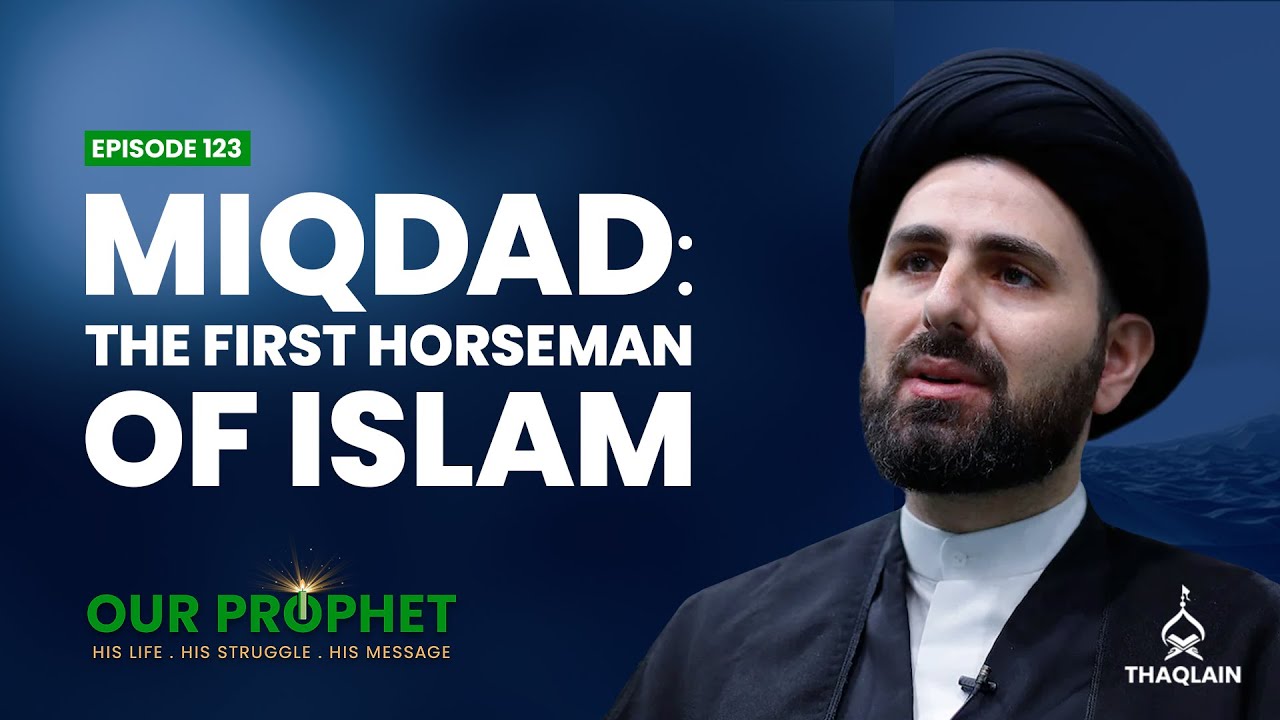Al-Muakhaat: Brotherhood Between Ansar and Muhajirun - Our Prophet 6 - 94/127
Next we will examine something very important that happened in Madinah. The Prophet, salla Allahu 'alayhi wa alihi, realized that there are two challenges internally and externally. From an internal perspective, his companions came from very diverse backgrounds. You had the people of Madinah, you had the people of Makkah, the migrants, different tribes, different races, different mentalities and it was unusual in Arabia to have a community from so many different backgrounds, because Arabia was based on tribal lines. You lived among your tribe.
In Madinah, you had so many different tribes, people from so many different tribes. And this presented a challenge. How will they get along? This is the first time that you have such a diverse community. How are they going to get along? This was the internal challenge.
The external challenge were the Non Muslims who lived in Madinah and around Madinah, particularly the Jewish tribes. How will we unite with them? The Prophet did not want any divisions in Madinah and it was expected that soon there would be divisions amongst his companions, because they come from very diverse backgrounds and races, ethnicities, tribes and also divisions with the Jewish population. So, the Prophet, in order to address these two concerns as a responsible community leader, he does two things.
To address the internal challenge, the Prophet conducts the pact of brotherhood. Al-Mu'akhat bayn al-Muhajirina wa al-Ansar. Between the migrants who came from Madinah and the people of Madinah who are called the migrants who came from Makkah to Madinah and the people of Madinah who were called the Ansar. The Ansar literally means the helpers, those who helped the Prophet, salla Allahu 'alayhi wa alihi.
When did the pact of brotherhood happen? Some, like Ibn Sa'd in his Tabaqat, he is a historian, he says it was done right after the Prophet arrived Madinah, within days this happened. Other historians state it happened several months after, possibly five months or more after.
So, one of the major steps that the Prophet took was to conduct the pact of brotherhood. The pact meant that they were now forging this brotherhood based on truth, helping each other and they would be like brothers. In fact, the pact of brotherhood was so strong such that the companions were under the impression that they would inherit one another. So, if one of them dies, the one who was assigned as a brother to him would actually inherit him. Some scholars believe that, in fact, this was part of Shari'ah, in those first two years until Badr, first year or two. In fact, it was the Shari'ah of Islam that those whom the Prophet, salla Allahu 'alayhi wa alihi, had assigned as brothers, they would inherit one another.
Then later, in Surat al-Anfal, in verse 75,[And those who later believed, migrated, and struggled alongside you, they are also with you. But only blood relatives are now entitled to inherit from one another, as ordained by Allah. Surely Allah has ˹full˺ knowledge of everything- 8:75] Allah abolishes this law and says no, inheritance is only between blood relatives, Ul ul-Arham- between your relatives. So, up until that point, before Allah revealed this verse, in fact they were under the impression that they would inherit one another.
So, scholars have two views about this. One group of scholars states in fact, this was the Shari'ah law that they would inherit one another. The second group of scholars state no, this was not Shari'ah law but they were under the impression that they would inherit one another, because the bonds of brotherhood were so strong between them. They felt as if they literally were brothers to the point where they would inherit one another.
So, this really reveals how significant this pact of brotherhood was. And remember, this was the second time the Prophet, salla Allahu 'alayhi wa alihi, conducted this pact. When was the first time? We talked about it last year. When was the first time? In Makkah, right before the Hijrah, the Prophet gathered the Muhajirin, who would be Muhajirin, of course, the people of Makkah, his companions and he made a pact of brotherhood with them. It was much more limited. Now in Madinah, the Prophet, salla Allahu 'alayhi wa alihi, makes the big one the most important one.
How many were they? Some historians state that those who were present when the Prophet conducted the pact were 90. 45 from the Muhajirin and 45 from the Ansar. So, you had a total of 90 amongst whom the Prophet made the pact of brotherhood. Other historians state a different figure. Some historians believe it was 300. 150 from the Muhajirin and 150 from the Ansar. So, we have these two historical reports. How do we reconcile them? Scholars have said this is how we reconcile them.
It seems that the pact of brotherhood actually continued for quite a long time. It was a continuous effort by the Prophet, salla Allahu 'alayhi wa alihi. So, the first time that the Prophet conducted the pact of brotherhood there were only 45 Muhajirin, who had come from Makkah. So, the Prophet assigned them to 45 from the Ansar. Then newcomers would be coming, right? Every day you had someone arriving from Makkah, someone coming from another place. So, the Prophet, salla Allahu 'alayhi wa alihi, would assign the newcomer to a brother in Madinah.
So, yes, we had 300 people, but it did not happen on the first day. The first stage was 90: 45 from each side, then it went up to 300. So that is one way to reconcile these different reports.
So, basically what the Prophet would do, he would assign a member from the Muhajirin, he would tell him that this is your brother from the Ansar and he would assign them as brothers. This meant that they would help each other, they would stand in truth and they would be there for one another. Whenever they needed anything, they would be there.
So, it was an ongoing program that the Prophet instituted in Makkah. Now, by the way, the Prophet did not only assign men as brothers, we also have historical reports that he assigned women from the Muhajirin as sisters to women from the Ansar as well. So, this was not something limited to the men only. The Prophet extended this honour of the pact of brotherhood or let us call it sisterhood for the sisters to the women as well. So, if there was a woman from the Muhajirin, the Prophet, salla Allahu 'alayhi wa alihi, would assign her as a sister to one of the women of the Ansar.
Als nächstes werden wir etwas sehr Wichtiges untersuchen, das in Madinah geschah. Der Prophet, salla Allahu 'alayhi wa alihi, erkannte, dass es zwei Herausforderungen gab, eine innere und eine äußere. Was die interne Perspektive betrifft, so kamen seine Gefährten aus sehr unterschiedlichen Verhältnissen. Es gab die Bewohner von Madinah, die Bewohner von Mekka, die Einwanderer, verschiedene Stämme, verschiedene Menschheitsrassen, verschiedene Mentalitäten, und es war ungewöhnlich in Arabien, eine Gemeinschaft mit so vielen verschiedenen Hintergründen zu haben, denn Arabien basierte auf Stammeslinien. Man lebte inmitten seines Stammes.
In Medina gab es so viele verschiedene Stämme, Menschen aus so vielen verschiedenen Stämmen. Und das war eine Herausforderung. Wie werden sie miteinander auskommen? Es ist das erste Mal, dass Sie eine so vielfältige Gemeinschaft haben. Wie werden sie miteinander auskommen? Das war die interne Herausforderung.
Die äußere Herausforderung waren die Nicht-Muslime, die in Medina und in der Umgebung von Medina lebten, insbesondere die jüdischen Stämme. Wie werden wir uns mit ihnen verbünden? Der Prophet wollte keine Spaltungen in Madinah, und es war zu erwarten, dass es bald zu Spaltungen unter seinen Gefährten kommen würde, da sie aus sehr unterschiedlichen Verhältnissen, Rassen, Ethnien und Stämmen stammten und auch Spaltungen mit der jüdischen Bevölkerung. Der Prophet tat also zwei Dinge, um diesen beiden Sorgen als verantwortungsvoller Führer der Gemeinschaft zu begegnen.
Um der internen Herausforderung zu begegnen, schloss der Prophet den Pakt der Brüderlichkeit. Al-Mu'akhat bayn al-Muhajirina wa al-Ansar. Zwischen den Einwanderern, die aus Medina kamen, und den Leuten von Medina, die die Einwanderer genannt werden, die von Mekka nach Medina kamen, und den Leuten von Madinah, die die Ansar genannt wurden. Die Ansar bedeuten wörtlich "die Helfer": diejenigen, die dem Propheten, salla Allahu 'alayhi wa alihi, geholfen haben.
Wann wurde der Pakt der Brüderlichkeit geschlossen? Einige sagen, wie Ibn Sa'd in seiner Tabaqat (einem hadithwissenschaftlichen Werk) - er war ein Historiker - dass es gleich nach der Ankunft des Propheten in Medina geschah - innerhalb weniger Tage. Andere Historiker sagen, es geschah mehrere Monate später - möglicherweise fünf Monate oder mehr.
Einer der wichtigsten Schritte, die der Prophet unternahm, war also der Abschluss des Paktes der Brüderlichkeit. Der Pakt bedeutete, dass sie nun diese auf Wahrheit und gegenseitiger Hilfe basierende Bruderschaft schmiedeten und wie Brüder sein würden. Tatsächlich war der Pakt der Brüderlichkeit so stark, dass die Gefährten den Eindruck hatten, sie würden sich gegenseitig erben. Wenn also einer von ihnen stirbt, würde derjenige, der ihm als Bruder zugewiesen wurde, ihn tatsächlich beerben. Einige Gelehrte glauben, dass dies in jenen ersten beiden Jahren Teil der Schari'ah war, bis Badr. In der Tat war es die Schari'ah des Islam, dass diejenigen, die der Prophet, salla Allahu 'alayhi wa alihi, als Brüder bestimmt hatte, sich gegenseitig beerben würden.
Später dann, in Surat al-Anfal, in Vers 8:75 [Und diejenigen, die später gläubig wurden, auswanderten und an eurer Seite kämpften, sie sind auch bei euch. Aber nur Blutsverwandte sind jetzt berechtigt, voneinander zu erben, wie Allah es bestimmt hat. Wahrlich, Allah hat über alles Kenntnis - 8:75] Allah hebt dieses Gesetz auf und sagt: Nein, das Erbe gilt nur zwischen Blutsverwandten, Ul ul-Arham - zwischen euren Verwandten. Bis zu diesem Zeitpunkt, bevor Allah diesen Vers offenbarte, hatten sie also tatsächlich den Eindruck, dass sie sich gegenseitig beerben würden.
Die Gelehrten haben also zwei Ansichten dazu. Eine Gruppe von Gelehrten sagt, dass dies tatsächlich das Schari'ah-Gesetz war, dass sie sich gegenseitig erben würden. Die zweite Gruppe von Gelehrten sagt: Nein, das war nicht das Schari'ah-Gesetz, aber sie hatten den Eindruck, dass sie einander erben würden, weil die Bande der Brüderlichkeit zwischen ihnen so stark waren. Sie hatten das Gefühl, dass sie buchstäblich so sehr Brüder waren, dass sie sich gegenseitig erben würden.
Das macht deutlich, wie bedeutsam dieser Pakt der Brüderlichkeit war. Und denken Sie daran, dies war das zweite Mal, dass der Prophet, salla Allahu 'alayhi wa alihi, diesen Pakt geschlossen hat. Wann war das erste Mal? Wir haben letztes Jahr darüber gesprochen. Wann war das erste Mal? In Mekka, kurz vor der Hidschra, versammelte der Prophet die Muhajirin, die natürlich Muhajirin sein würden, die Leute von Mekka, seine Gefährten, und er schloss mit ihnen einen Pakt der Brüderlichkeit. Er war viel begrenzter. In Medina nun macht der Prophet, salla Allahu 'alayhi wa alihi, den Großen, den Wichtigsten.
Wie viele waren es? Einige Historiker geben an, dass es 90 Personen waren, die anwesend waren, als der Prophet den Pakt schloss. 45 von den Muhajirin und 45 von den Ansar. Es waren also insgesamt 90, unter denen der Prophet den Pakt der Brüderlichkeit schloss. Andere Historiker geben eine andere Zahl an. Einige Historiker glauben, dass es 300 waren. 150 von den Muhajirin und 150 von den Ansar. Wir haben also diese beiden historischen Berichte. Wie können wir sie miteinander in Einklang bringen? Die Gelehrten haben gesagt, dass wir sie so in Einklang bringen können.
Es scheint, dass der Pakt der Brüderlichkeit tatsächlich ziemlich lange Bestand hatte. Es war eine kontinuierliche Anstrengung des Propheten, salla Allahu 'alayhi wa alihi. Das erste Mal, als der Prophet den Pakt der Brüderlichkeit durchführte, gab es nur 45 Muhajirin, die aus Mekka gekommen waren. Also wies der Prophet sie 45 von den Ansar zu. Dann kamen immer wieder neue Leute, nicht wahr? Jeden Tag kam jemand aus Mekka oder von einem anderen Ort. Also wies der Prophet, salla Allahu 'alayhi wa alihi, den Neuankömmling einen Bruder in Medina zu.
Also, ja, wir hatten 300 Leute, aber nicht am ersten Tag. In der ersten Phase waren es 90: 45 von jeder Seite, dann stieg die Zahl auf 300. Das ist also eine Möglichkeit, diese unterschiedlichen Berichte in Einklang zu bringen.
Was der Prophet also im Grunde genommen tat, war, dass er ein Mitglied der Muhajirin zuwies; ihm sagte, dies sei dein Bruder von den Ansar, und er wies sie als Brüder zu. Das bedeutete, dass sie sich gegenseitig halfen, dass sie in der Wahrheit standen und füreinander da waren. Wann immer sie etwas brauchten, waren sie zur Stelle.
Es war also ein fortlaufendes Programm, das der Prophet in Mekka einführte. Übrigens hat der Prophet nicht nur Männer zu Brüdern ernannt, wir haben auch historische Berichte, dass er Frauen von den Muhajirin als Schwestern zu Frauen von den Ansar ernannte. Das war also nicht nur auf die Männer beschränkt. Der Prophet dehnte diese Ehre des Paktes der Brüderlichkeit, oder nennen wir es Schwesternschaft, für die Schwestern, auch auf die Frauen aus. Wenn es also eine Frau von den Muhajirin gab, wies der Prophet, salla Allahu 'alayhi wa alihi, sie einer der Frauen von den Ansar als Schwester zu.






































